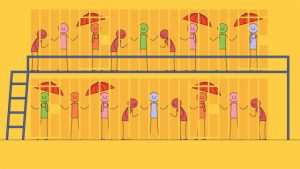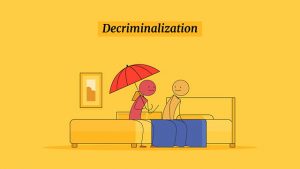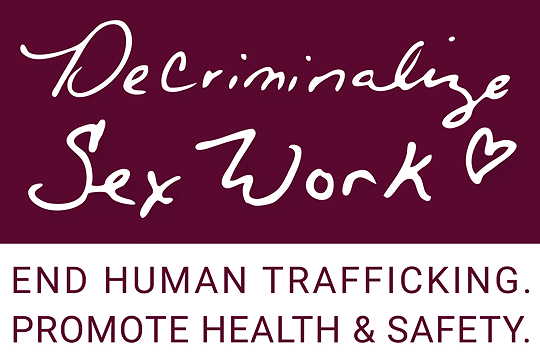FAQs about the decriminalization of sex work
WHAT YOU NEED TO KNOW ABOUT SEX WORK
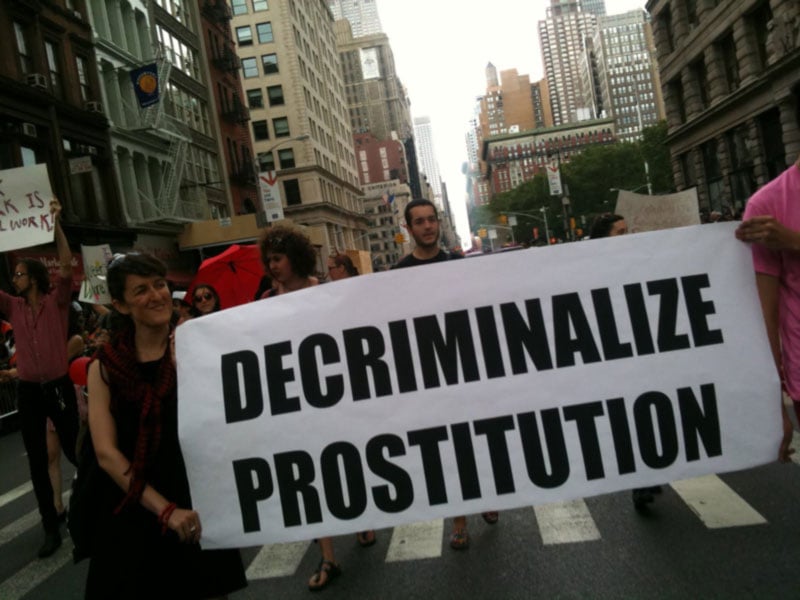
Q. What is sex work?
A. Sex work is the exchange of sexual services (sex, erotic dancing, pornography, etc.) for money or something of value. Sex workers have different reasons for doing sex work. Some choose sex work among other well paying jobs and some are in circumstances that lead them to sex work even if it is not their first choice for earning income. Some individuals are forced and/or coerced into sex work — this is human trafficking, a crime that occurs across many labor sectors.
Each state has different laws regulating sex work. Most states have a number of laws prohibiting prostitution. To make it more confusing, each jurisdiction has a different exact definition of what activities count as prostitution. In some states, BDSM, fetish, and other types of sexual play are explicitly included in definitions of prostitution, whereas in other states, they are not considered to be “sexual conduct” as defined by prostitution laws.
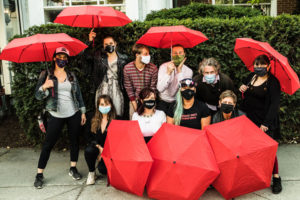
Q. What’s the difference between “sex work” and “prostitution”?
A. Sex work includes the entire field of sexual services, both legal and illegal, including pornography, exotic dancing, fetish work, web-based work, and prostitution. Prostitution is the kind of sex work most often criminalized, and it is the direct, in-person exchange of sex for money or other things of value.
Q. Will decriminalizing sex work lead to an increase in human trafficking?
A. No. Too often, laws and lawmakers conflate human trafficking with consensual adult sex work. Human trafficking is when an individual or group uses force, fraud, or coercion to compel another into some kind of labor, including commercial sex acts. Human trafficking is an egregious abuse of human rights and a critical public health issue. Sex work is when adults choose to offer sexual services in exchange for something of value, usually money.
Prostitution and anti-trafficking laws make it impossible for victims and witnesses to report exploitation without risking prosecution. When innocent people are arrested and prosecuted, victims face barriers to services, and exploitation proliferates in the black market.
Where sex work has been decriminalized, human trafficking in the sex industry has decreased. For more information read our briefing paper on human trafficking.
Q. Why is the Entrapment Model, a.k.a. the Nordic Model, End Demand Model, Swedish Model and Equality Model a bad policy?
A. The Entrapment Model refers to the theory that criminalizing clients and third parties (e.g., managers) will reduce demand in the sex trade, thereby “freeing” sex workers, who are often seen as victims. This framework has vocal proponents among certain prohibitionist feminists, but its impact has been devastating where it has been implemented. Unambiguous data shows a clear correlation between laws that criminalize clients and an increase in violence against sex workers, sexually transmitted infections (STIs), and exploitation within the sex trade. While the Entrapment Model may seem enticing in theory, it’s impossible to create a safe environment for sex workers and their clients when one side of the transaction is criminalized.
For more information read our briefing paper Debunking the Entrapment Model, a.k.a. the End Demand Model.

Q. Is policing sex work effective at stopping prostitution, preventing human trafficking, reducing STIs, and making society safer?
A. No. Tens of thousands of people are arrested annually in the United States for prostitution and related charges. The majority of those arrested are adults who engage in consensual, victimless activities. Where sex work is decriminalized, law enforcement is able to focus resources on prosecuting human trafficking and other violent crimes.
Where sex work is decriminalized, sex workers and their clients are safer, STIs are reduced, and there is less human trafficking. For more information read our briefing papers:
* Why Decriminalizing Sex Work Is Good Criminal Justice Policy
* Decriminalize Sex Work for Better Policing
* Human Trafficking and Sex Work
* Decriminalize Sex Work for Public Health
* New Zealand: The Ideal Legal Framework for Decriminalized Sex Work
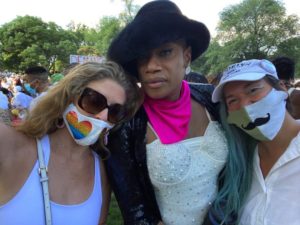
Q. Are prostitution laws racially enforced?
A. Across the United States, people of color are targeted by police more often than white people for low-level crimes such as drug possession. The same is true for sex work. Women of color are especially targeted, harassed, and arrested for prostitution crimes at much higher rates than their white counterparts.
For more information read our briefing paper Race, Sex Work, and Stereotyping.
Q: Would decriminalization lead to an increase in STIs?
A. Numerous public health agencies have stated that decriminalizing prostitution is one of the most important policy shifts necessary to prevent HIV and STI infections.
Where sex work is illegal, those involved are more likely to engage in riskier behaviors. Sex workers are less likely to refuse to have condomless sex. Law enforcement often use condoms in a wallet as evidence of prostitution, preventing some people from wanting to carry them in large numbers, even from the store to home. Also, as stigma is reduced, condom usage is known to increase.
Studies have shown that in the few places around the world where sex work is decriminalized, like New Zealand, the rate of STIs has gone down. For more information see our briefing paper on public health.
Q. How will this affect criminal justice resources?
A. In most jurisdictions, tens of thousands of dollars are spent needlessly arresting and processing nonviolent sex workers. This money could be better spent investigating violent crimes such as rape, assault, and robbery.
For more information read our briefing paper Why Decriminalizing Sex Work Is Good Criminal Justice Policy.
Q. Why don’t sex workers report crimes to the police?
A. In most jurisdictions, sex workers are not guaranteed immunity from the criminal codes they have broken while working. As such, they put themselves at risk if they seek to report crimes or information they have about crimes. Worse, due to the illegality of prostitution, law enforcement often has an adversarial relationship with sex workers. Sex workers are frequently targeted by police and their human rights are violated. Decriminalization will allow sex workers to collaborate with law enforcement, increasing public health and safety for all.
Read about Criminal Legal Immunity for reporting crimes here.
Q. Won’t decriminalizing sex work mean there will be more street-based prostitution and lewd activity in public?
A. Where sex work is decriminalized, sex workers have more options to conduct their business indoors – which most would prefer to do. They are able to legally advertise their services and find clients without standing on the street. When we decriminalize sex work, communities can still have laws against lewd activity in public. Since New Zealand decriminalized sex work in 2003, there has been less street based prostitution.
For more information read our briefing paper New Zealand: The Ideal Legal Framework for Decriminalized Sex Work.
Q. How is decriminalization different from legalization?
A. Legalization of sex work would create a set of laws, codes, and regulations specific to the sex industry. People who buy or sell sex outside of these rules would be breaking the law and subject to arrest, conviction, and punishment.
Decriminalizing sex work means that consenting adults who buy or sell sex are not committing a crime. There would, of course, still be laws against trafficking, rape, violence, and sex work involving minors.
For more information read our briefing paper What About Legalization? Decriminalization Is the Only Solution.
Q. What do police think of this?
A. A lot of police support decriminalization. They see that their hard work is useless and doesn’t help anyone in the endless system of arrests and processing. In addition, they find websites and legal operations very helpful in criminal investigations. They are among the voices that cried out against the closure of sex work advertising sites such as Backpage and Craigslist, both American companies that were helpful to them in critical investigations.
For more information on why the decriminalization of sex work improves policing, read our briefing paper Decriminalize Sex Work for Better Policing.

Q: Will decriminalizing prostitution increase violent crimes against women?
A. There is zero evidence that prostitution causes trafficking, domestic violence, or any other crimes against women and ample evidence that decriminalizing sex work increases the health and safety of sex workers, many of whom are women. In fact, indoor prostitution was inadvertently decriminalized in Rhode Island for many years, during which the rate of violence against women dramatically decreased. For more information read the peer reviewed academic report Decriminalizing Indoor Prostitution: Implications for Sexual Violence and Public Health by Scott Cunningham and Manisha Shah.
Q. Why do you use the term “sex worker”?
A. First, it is the term sex workers all over the globe have said they prefer. Second, the term sex worker helps us see that sex work is a job, not an identity.
Q. I’m concerned about child abuse. How is this helping?
A. Ninety-six percent of victims of child abuse were abused at home by somebody they knew. This is an important and critical issue that has nothing to do with sex workers.
![]()
The Four Basic Types of Prostitution Laws
What are the four basic legal frameworks around sex work?
DSW Supports the Decriminalization Model for Prostitution (and Sex Work Generally)
Decriminalization, in which criminal and civil penalties have been eliminated for both the consumer and the provider, regardless of whether the sexual services are provided by solo entrepreneurs in hotel rooms or private residences, or in licensed businesses known as brothels is optimal for the health and safety of all.
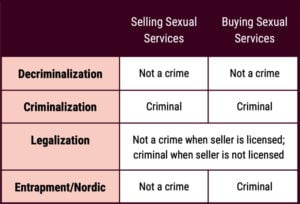
1. DECRIMINALIZATION:
Decriminalization supports the health, safety, and rights of all. This ideal policy would remove penalties for independent contractors (solo practitioners who are akin to housekeepers, caregivers for elderly or disabled people, or home-based hair stylists) as well as businesses (which have owners, waged employees, and discrete locations). Unequivocal evidence from around the world demonstrates that the decriminalization of sex work increases public health and safety and decreases exploitation and trafficking. Read more resources on this evidence here.
2. CRIMINALIZATION:
Criminalization promotes exploitation. Except for the regulated brothels in rural parts of Nevada, prostitution and related acts are criminalized everywhere in the U.S. This widespread criminalization keeps the sex industry underground; removes the ability of workers to exert their rights or redress wrongs/violence committed against them; and places people in a cycle of arrest and incarceration.
3. LEGALIZATION:
“Legalization” doesn’t solve the problem. A law that allows only brothels (licensed businesses at specific locations only) is called the “legalization” model. This policy, which describes Nevada’s law, represents a partially good law that should nevertheless be avoided, because prostitution in the privacy of hotel rooms or bedrooms should not be criminalized. The partial approach of “legalization” is akin to arresting your hairdresser neighbor who styles your hair in your home instead of her salon, or allowing alcohol consumption in bars but criminalizing it in your kitchen.
4. THE ENTRAPMENT MODEL:
The Entrapment Model is harmful. The Entrapment Model, also known as the End Demand Model, Nordic Model, Swedish Model, and Equality Model, imposes criminal penalties on clients but not sex workers. This isn’t even a compromise but rather a thoroughly bad policy, as it’s akin to allowing a store to sell alcohol but criminalizing the customers. The result is that customers continue paying for sex in the criminal arena, jeopardizing the liberty of both parties and the safety of the community. For more information read our briefing paper Debunking the Entrapment Model, a.k.a. the End Demand Model.
Helpful links, articles, and reference material relating to sex worker rights and the decriminalization of Sex Work
![]()
Community Resources
HIV and Sex Workers (2024 GLOBAL AIDS UPDATE. Thematic briefing note. Geneva: Joint United Nations Programme on HIV/AIDS)
Sex Worker and LGBTQIA Resource Guide: COVID-19 (New York Transgender Advocacy Group, GLITS, and Decriminalize Sex Work, March 2020)
![]()
Academic Journals and Reports
Sex workers need the police to do better, not more (Open Democracy, 21 November 2024)
Sex work within emerging Latino immigrant communities: A typology (Grieb, Flores-Miller, Sherman, Page; Cult Health Sex. 2022 Mar; 24(3): 374–390.)
Criminalizing the Sex Buyer: Experiences from the Nordic Region (Vuolajärvi, Nina, Centre for Women, Peace and Security Policy Brief, London School of Economics, 6/2022)
Sex work community participation in criminalized environments: a community-based cohort study of occupational health impacts in Vancouver, Canada: 2010–2019 (International Journal for Equity in Health, February 9, 2022)
“Feeling Safe, Feeling Seen, Feeling Free”: Combating stigma and creating culturally safe care for sex workers in Chicago (Singer RB, Johnson AK, Crooks N, Bruce D, Wesp L, Karczmar A, Mkandawire-Valhmu L, Sherman S. PLoS One. 2021 Jun 29;16(6):e0253749. doi: 10.1371/journal.pone.0253749. PMID: 34185795; PMCID: PMC8241054.)
Evaluation of Prosecutorial Policy Reforms Eliminating Criminal Penalties for Drug Possession and Sex Work in Baltimore, Maryland (Johns Hopkins Bloomberg School of Public Health, 2021)
Over-Policing Sex Trafficking: How U.S. Law Enforcement Should Reform Operations (USC Gould School of Law–International Human Rights Clinic, 2021)
Community-Based Responses to Negative Health Impacts of Sexual Humanitarian Anti-Trafficking Policies and the Criminalization of Sex Work and Migration in the U.S. (Hoefinger et. al, 2020)
Craigslist Reduced Violence Against Women (Cunningham et. al, 2019)
Latin American and Caribbean Sex Workers: Gains and challenges in the movement (Anti-Trafficking Review, (12), 37-56. https://doi.org/10.14197/atr.201219123)
Twenty Years of Failing Sex Workers: A community report on the impact of the 1999 Swedish Sex Purchase Act (Fuckförbundet, 2019)
The Nature and Prevalence of Prostitution and Sex Work in England and Wales Today (University of Bristol, 2019)
A Review of the Criminalisation of Paying for Sexual Services in Northern Ireland (Queens University Belfast School of Law/Ellison, Ní Dhónaill and Early 2019, on behalf of the UK DOJ)
Diversion From Justice: A Rights-Based Analysis of Local “Prostitution Diversion Programs” and Their Impacts on People in the Sex Sector in the United States (Yale Law School, 2018)
Decriminalizing Indoor Prostitution: Implications for Sexual Violence and Public Health (Cunningham and Shah, 2018)
Un-Meetable Promises: Rhetoric and Reality in New York City’s Human Trafficking Intervention Courts (Yale Law School, 2018)
Stigma in the Sex Trades (Wolf, 2018)
Research Brief: After SESTA/FOSTA (The Samaritan Women)
The Swedish Law To Criminalize Clients: A failed experiment (American University, Washington College of Law/Jordan, 2017)
Beyond the Gaze: Briefing on Customers Who Buy Sex Online (University of Leicester/Sanders et. al, 2017)
The Intersection of Sex Work and HIV Criminalization (The Center for HIV Law and Policy, 2017)
Decreasing Human Trafficking Through Sex Work Decriminalization (Albright and D’Adamo, 2017)
The Human Cost of ‘Crushing’ the Market: Criminalization of Sex Work in Norway (Amnesty International, 2016)
Ten Reasons to Decriminalize Sex Work (Open Society Foundations/Public Health Program, 2015)
A Decade of Decriminalization: Sex work ‘down under’ but not underground (Abel, 2014)
New Directions in Research on Human Trafficking (AAPSS/Weitzer 2014)
Decriminalization of Sex Work To Fight HIV Infections Worldwide (The Lancet, 2014)
Moving Beyond Supply and Demand ‘Catchphrases: Assessing the uses and limitations of demand-based approaches in anti-trafficking (Global Alliance Against Traffic in Women, 2011)
The Impact of the Prostitution Reform Act on the Health and Safety Practices of Sex Workers (Abel et. al., 2007)
![]()
DSW’s Book List
Sex Workers Unite: A History of the Movement from Stonewall to SlutWalk, by Melinda Chateauvert
Revolting Prostitutes: The Fight for Sex Workers’ Rights, by Molly Smith and Juno Mac
Naked Truth: Strip Clubs, Democracy, and a Christian Right, by Judith Lynn Hanna
Getting Screwed: Sex Workers and the Law, by Alison Bass
State of Sex, by Barbara Brents
Emergent Strategy: Shaping Change, Changing Worlds, by Adrienne Maree Brown
The Managed Heart: Commercialization of Human Feeling, by Arlie Russell Hochschild
![]()
Organizations and Allies
AMERICAN CIVIL LIBERTIES UNION
It's Time To Decriminalize Sex Work
Amnesty International
Sex Worker Rights are Human Rights (2015)
Amnesty International pushes policy and research on protection of sex workers rights (2016)
Q and A on policy to support the human rights of sex workers
Ireland: Laws criminalizing sex work are facilitating the targeting and abuse of sex workers
Equality Now
Global Network of Sex Worker Projects
Don’t Hate or Conflate!: Trafficking Brief from NSWP
A Community Guide: Sex-Workers Experiments of Stock-Outs of Commodities and Treatments
Sex Work and the Law: Understanding Legal Frameworks and the Struggle for Sex Work Law Reforms
Helping Individual Prostitutes Survive (HIPS) DC
Human Rights Watch
Why Sex Work Should Be Decriminalized (2019)
US: Block Law Endangering Sex Workers (FOSTA) (2019)
Stop Criminalizing Sex Work in DC: Dozens of groups urge passage of decriminalization Bill (2019)
Landmark UN Report Calls for Sex Work Decriminalization: End Criminalization, Protect Women’s Rights (2023) [download report]
New York Transgender Advocacy Group (NYTAG)
Dismantling Stigma in the Transgender and Gender Nonconforming Community
Red Canary Song
How Red Canary Song Is Advocating for Migrant Sex Workers
Sex Worker Outreach Project - United States
Know Your Rights Manual for the Sex Worker Community: Criminal Law (National Lawyers
Sex Workers Project (Urban Justice Center)
The Use of Raids to Fight Trafficking in Persons (2009)




